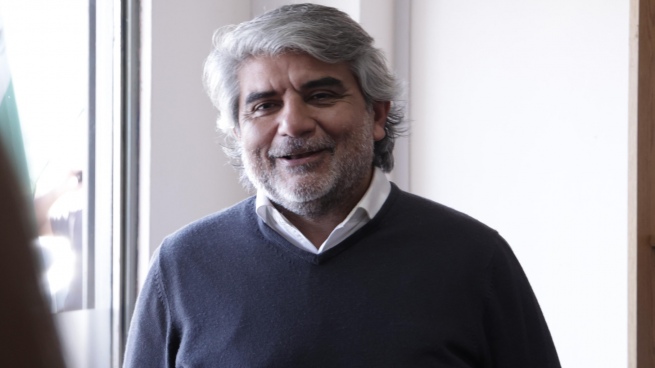The Buenos Aires Minister of Labor, Walter Correa, highlighted the “great effort” that the national government has been making in the framework of joint state and private negotiations so that “salaries improve” and was confident that the inflation rates ” They will decrease.”
“If the opposition comes to take control of the state again, it will be disastrous for the entire working class, for small and medium-sized businesses, and for cooperatives,” the official assured in an interview with Télam and stressed that the government is carrying out its maximum effort “to reverse that time bomb that they left us, which is the agreement with the IMF”.
Correa (57) began his militancy in Peronism at a very young age and at 19 he was a union delegate in a factory. The former national deputy of the Frente de Todos and general secretary of the Union of Tanners of the Argentine Republic (Socra) replaced Mara Ruiz Malec in the Buenos Aires labor portfolio last month, who was appointed as director of the AFIP.
“If the opposition manages to take control of the state again, it will be disastrous for the entire working class, for small and medium-sized businesses, and for cooperatives”
In the dialogue with Télam, when making a balance of this first month of management, he referred to the fact of being the first union leader who assumes in Buenos Aires territory as head of the labor portfolio, he stated that “it is not an individual issue, but a collective one ” and stressed that he has ahead of him “the responsibility of representing a group of workers in the highest position in the area in the province, of demonstrating suitability, capacity and willingness to work.”
A native of the municipality of Moreno, a district in which he was a councilman, he is a benchmark for the CFT-CGT Federal Workers Current, and a leader close to Vice President Cristina Fernández de Kirchber. At the same time, he is a member of the trade union branch of the Buenos Aires Justicialist Party (PJ).

– What did Governor Axel Kicillof entrust to you?
– The continuity of what Ruiz Malec had already been doing: working in the territory, taking into account its immense surface area, together with the mayors, unions and companies. The idea is that the Ministry empowers and drives the world of work, the workers, their union organizations, cooperatives, SMEs, large companies. My idea is to drive the world of work, where the largest number of citizens live. It is necessary to assemble from work with economy, production and health. For that, we began to promote joint work with the productive sectors to continue building the province that we deserve. My driver, who is Cristina Fernández de Kirchner, said in Ensenada that the State has to lead the capital. That is what we intend to drive from the Ministry.
– What is the link that you will face with the unions?
– There is satisfaction on the part of the unions. I was a soldier as a kid, I was a factory delegate at the age of 19, in 1984. They see a colleague at the head of the labor portfolio.
– What are your main objectives for the area?
– We started with the premise that within the law everything, outside the law nothing. The great challenge is to deepen Kicillof’s mandate to give imprint to the regions hand in hand with each labor group.
– Will inspections continue in different areas to achieve labor regularization?
– Yes. We are reviewing the results of the inspections led by Ruiz Malec. We are going to resume that task, with a new profile: we are going to communicate before inspecting. We will spread the word in neighborhoods, squares or railway stations. There are benefit issues for employers regarding domestic workers. We will continue to dig deeper.
– Three weeks ago the province granted a 25% increase to state workers and promised to reconvene the unions in October. Is there already a date for the meeting?
– We don’t have a specific date. When the governor, the Ministry and the unions sit at a table, we have a clear and concise conception that we are all partners. It is not a parity like the ones I was used to in the private sector. The province is making a great effort to reach agreements with the union organizations. Beginning in October we will be sitting with the companions.
– Are you going to advance sections from January and March to November and December?
– Each union organization has its position. We want these concerns and ideas to materialize in the meeting that we will have in the course of October.
– How will you face next year so that your wages do not lose with inflation, in a context of crisis?
– The governor’s effort is remarkable considering the inflationary issues and the economic issue. Somehow, there is a process of tension and I see that the inflationary issue will decrease. We have to make a strong effort to financially compensate workers not only from the State but also from the private sector. This situation must be improved, it is necessary. As a Peronist militant, I see in the neighborhood where I live, but also in the industry, that jobs are gradually increasing. There is work, but we need wages to gradually improve. The national State is working on that and we have to continue on that path.
– Can an adequate redistribution of income be achieved?
– Yes. We are Peronists and our maximum goal is 50-50. Today we are at almost 60-40. We still have to travel that path and I dream that we will achieve it.
– How do you work to support employment?
– We are in a globalized world, with sophisticated issues in which we do not have to fear technology. Japan has 2% unemployment and is a country with the highest technology. I am an industrial worker. We have to fit into that framework. There are basic issues that have to be organized and we have to have the capacity from the province so that we can do that Chinese train in the province. That train has to assemble workers, production, raw materials, distribution and logistics. Each union, each SME and each company must understand that we must assemble a productive train. We cannot have Chinese metallurgical. That is the task and the challenge: how do we assemble what we have and guarantee elementary issues, such as raw materials. It is essential to strengthen employment and improve the working conditions of workers.








